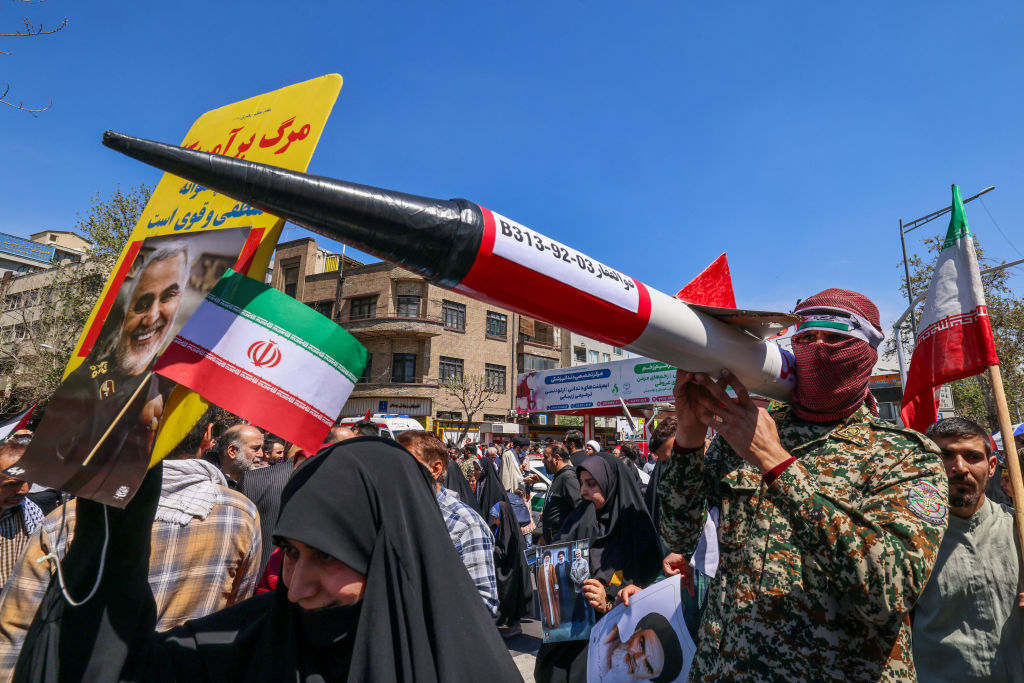Israel must respond harshly to Iran’s massive ballistic missile attack on its territory. The country’s government has to restore favourable deterrence following Iran’s very deliberate attempt to kill Israeli civilians and destroy civilian infrastructure. But how will Israel respond?
Some analysts believe Israel may attack Iran’s oil industry, or its nuclear programme. President Joe Biden says he opposes both options and wants Israel to look for alternative targets. Biden’s rationale on the oil industry concern is centred around US domestic politics: one month away from the US election, he doesn’t want his Vice President to have to deal with a sharp increase in oil prices that reverberates into the US economy. Still, strikes against Iran’s oil industry would make strategic sense for Israel. Such strikes would degrade the Iranian regime’s only significant economic lever and ultimately deter future Iranian attacks.
Biden is right to oppose an Israeli attack on Iran’s nuclear programme, however. To be sure, that nuclear programme is a big problem. It is designed to provide Ayatollah Ali Khamenei with two very concerning possibilities. The first is his ability to quickly rush towards employing a nuclear weapon should he decide to do so. Iran has stockpiled enough near-weapons grade purity nuclear material to allow it to facilitate a nuclear weapon within two weeks. The second is to credibly threaten the existence of both Israel and Iran’s Islamic nemesis, Saudi Arabia.
The problem is that Israel alone cannot destroy Iran’s nuclear programme. What’s more, destroying the programme isn’t nearly so simple as bombing a bunch of nuclear plants and research facilities. Iran learned the lesson from Israel’s attacks on Iraq’s Osirak reactor in 1981 and Syria’s Dair Alzour reactor in 2007. Tehran has distributed its nuclear programme widely across the country. It has also buried significant portions of it deep underground. To destroy Iran’s nuclear capability in its entirety, Israel would need to conduct a multi-day air campaign targeting a very large number of sites. It would also need to simultaneously destroy significant parts of Iran’s air defence network and air force.
Even then, Israel wouldn’t be able to secure success. It would also need to deploy ground forces to physically breach and destroy the underground nuclear facilities at Natanz and Fordow. US military sources I’ve spoken to have expressed doubt that even latest-generation US bunker buster munitions (which Israel does not possess) could destroy these facilities with certainty. But getting a commando force deep inside Iran, deep into varied facilities, blowing them up, then exfiltrating would require airlift and close air support capabilities that Israel lacks. It would also require airfield seizures through which to exfiltrate the commandos.
It’s one thing blowing up Hezbollah pagers and bunkers; it’s a very different thing operating at vast scale and depth against a very large defensive force primarily orientated towards defending the very thing Israel would be attacking.
Israel knows this. Which is why successive Israeli governments have put significant pressure on successive US administrations to outline conditions under which the US might join Israeli strikes. But that leads to the extended consideration here: what would happen if Israel did attack Iran’s nuclear programme?
The answer to that question underlines why the last few US presidents have been so deeply hesitant to entertain strikes in that vein. It’s because they know that doing so would invite a full-scale regional war. Khamenei and those at the regime’s ideological power centre regard the nuclear programme both as the guarantee for and destiny of their Islamic Revolution. They would view an Israeli attack on this destiny through a joined political-theological lens of existential threat.
Already paranoid following Israel’s devastation of Hezbollah and intelligence penetration of the Islamic Revolutionary Guard Corps, they would lash out wildly, feeling they had nothing left to lose. They would attempt to strangle trade flows through the Strait of Hormuz, unleash terrorist and missile attacks at US and Israeli bases around the world, and would generally fight hard in the hope that they could bloody Israel and the US enough to win a salvation ceasefire. This is why the US has traditionally reserved its military option for the event in which Iran attempted to actually build and deploy a nuclear weapon.
Again, however, the top line concern is that absent the US military’s support, Israel cannot destroy Iran’s nuclear programme. So the ensuing chaos of any Israeli attack would serve little purpose beyond the thin possibility it might lead to war — and perhaps regime change — in Iran.











Join the discussion
Join like minded readers that support our journalism by becoming a paid subscriber
To join the discussion in the comments, become a paid subscriber.
Join like minded readers that support our journalism, read unlimited articles and enjoy other subscriber-only benefits.
Subscribe